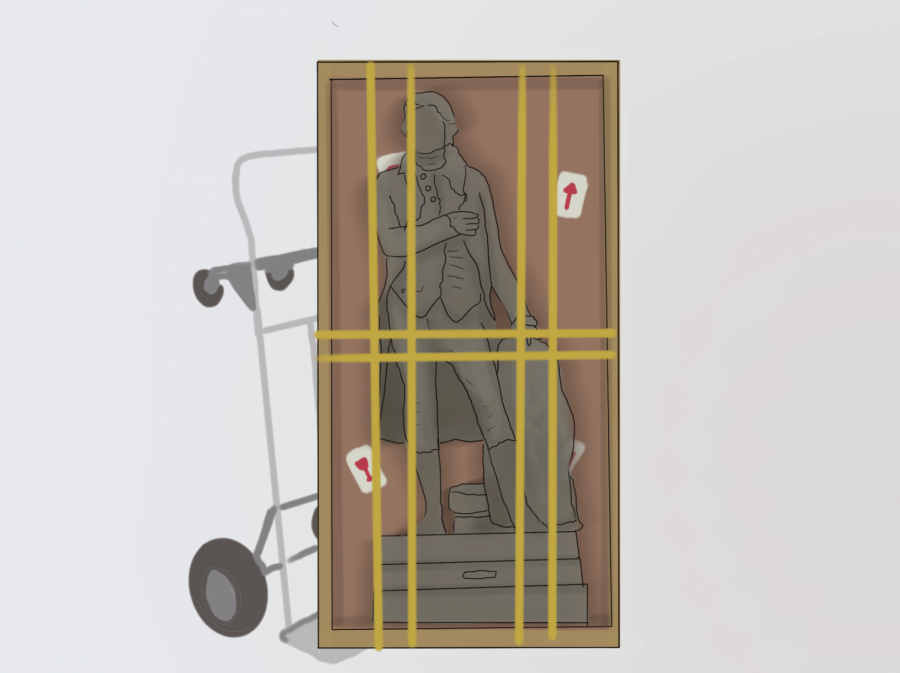Thomas Jefferson statue will rightfully be removed from City Hall
The Ticker
November 6, 2021
“New York City will exile Thomas Jefferson’s statue from a prominent spot in city hall,” NPR reported on Oct.19. In the middle of butting heads and castigation over what constitutes the removal of a statue, especially that of an individual held in such high regard as a Founding Father, context reigns king.
In this context, it is safe to say that Jefferson’s statue should be removed, and the questioning of the removal can be answered by self-evaluation on a national scale.
Whether it be the Three-fifths Compromise, the token claims of equity of Reconstruction or the ground-breaking yet incomplete passage of the 1965 Civil Rights Act, the history of people of color in the United States holds an important theme of oppression. This oppression not only comes from those who proclaimed themselves as their “masters,” but also from the hands of their so-called “liberators.”
Despite the perpetual onslaught from people who claim that labeling such figures as George Washington, James Maddison or Archibald Gracie as slave owners is a blasphemous act comparable to spitting on the American flag, state authorities continue to remove commemorations to individuals who served a role in perpetuating or upkeeping the practice of slavery.
Whether Americans would like to admit it or not, genocide, ethnocide and slavery are intertwined into U.S. history. Oftentimes, these atrocities proved fundamentally important to the building of the country.
For the average American who has been taught from the start of their education that the United States is pure, filled with unyielding glory, liberty and justice, to hear that their country is anything but, defies comprehension and thus is met with opposition.
As a Founding Father of this nation, this conflict inherently extends to the life and actions of Jefferson.
Ambassador to France, father of independence and patron of religious rights across the country, Jefferson has been written into history textbooks all across the nation. What is not told is that the same hero was a perpetrator of slavery; an adamant believer in white superiority.
This history is what sparked the movement toward the removal of Jefferson’s statue from City Hall.
According to testimony from members of the Black, Latino and Asian caucus, who sent a letter in June 2020 to New York City Mayor Bill de Blasio calling for its removal the statue serves as an everlasting reminder of the nation’s dark history and is an embodiment of the inhumane treatment of its people.
De Blasio spoke out in support of the caucus offering his sympathy and insight into the inherent nature of the debate.
“The thing that is so troubling to people is that even someone who understood so deeply the values of freedom and human dignity and the value of each life was still a slave owner…And I understand why that profoundly bothers people,” he said to ABC News.
On the same day, the Council came to a unanimous consensus that the statue shall be removed, leaving no room for discussion.
To achieve synthesis and enhanced comprehension of the deeply complex debate surrounding the removal of the statue, however, one must stare complexity down the barrel.
The concept and establishment of a statue of Jefferson was conceptualized by Naval Commodore Uriah P. Levy, a Jewish-American. This bears immense significance as the commodore chartered the construction of the statue within the walls of City Hall as an homage to Jefferson for his patronage of religious rights across the nation.
Levy himself, being a Jewish man subjected to constant persecution for his religious beliefs, saw in Jefferson not only a Founding Father, but a hero who he felt stood up for the rights of people like him.
To those who stand in opposition to the proposed ruling, this historical context serves as a means of rebuttal upon the assertion that the statue represents the oppression of all people of color.
Upon the ruling regarding the formal removal of the statue, City Hall has another important decision to make — where to put it.
Some have advocated for the statue to be relocated to the Governor’s Room as an element of history and a learning opportunity, one of them being historian Todd Fine.
“It was a gift to the city from a Jewish naval officer in honor of Jefferson’s position on religious freedoms. It should stay in the building,” Fine, who submitted a letter signed by 15 other historians, said to CBS News.
However, not everyone agrees, as many council members claim that the presence of the statue within City Hall serves no purpose and should be registered at a public library or The New York Historical Society.
No matter where the statue is relocated, it shall inevitably be shrouded in controversy.








liam • Jan 4, 2024 at 11:33 am
i say not to remove statues because they were good at what they were doing.